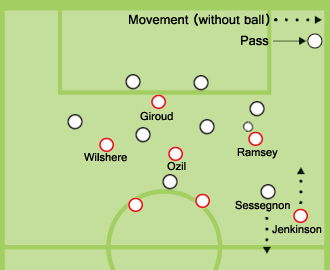Sometimes you have to trust coaches to make decisions based on intuition and a certain foresight acquired over managing many matches, rather than any piercing tactical insight. In a sense, that’s what happened at The Hawthorns in Arsenal’s 1-1 draw with West Brom as Jack Wilshere endured a difficult first-half. He was bumped off the ball easily, relinquished possession cheaply and was unable to influence the game with his trademark burst. But Arsene Wenger stuck by him when some fans began to lose patience, and he was vindicated when Wilshere struck a venomous shot which took a deflection to give Arsenal the equaliser.
It was down to a bit of bad luck that the goal came when it did because four minutes earlier, Aaron Ramsey was forced to leave the pitch as he was struggling with injury. On came Tomas Rosicky, moving Wilshere to the right-hand side thus allowing him to cut inside on his favoured left-boot, and sure enough, the two combined to score.
The injury to Ramsey essentially denied Wenger of having to make the big decision at one-nil down of whether to take off Flamini, thus theoretically exposing Arsenal more on the counter-attack. Because ultimately, he had one sub that he had complete faith in – Tomas Rosicky – and as such, Jack Wilshere probably wouldn’t have been replaced anyway despite his struggles.
Wenger’s faith in Wilshere also lay in the fact that he’s one of the few players in the narrow system that Arsenal deployed which could provide something different. The 4-4-1-1 that Arsenal played, without nominal wingers, meant that the type of goal Arsenal were always going to score was through slick interchange through the centre, and taking Wilshere off would have lessened the effectiveness of the strategy. Indeed, despite struggling in the first-half, there were flashes of what Wilshere could bring and it was a case of him just getting the right break to make it work.
He had a great understanding with Kieran Gibbs, especially important as he was reluctant to go on the outside therefore he used the left-back as a decoy at every given opportunity. One good chance where Gibbs flashed a shot over highlighted the burgeoning partnership between the two as without looking, Wilshere let the ball run between his legs from a Mesut Ozil pass to the onrushing Gibbs. He knew Gibbs would always have the space to make that run. Wilshere frequently kept on cutting inside and played some neat one-twos with Ozil, but it was when he was moved to the right in the second-half where he became more effective.
Wilshere’s impact also highlights the growing importance in the modern game of the creative winger. Often these days, squads are built with a surplus of attacking players, so in a bid to fit them all in, coaches are sometimes compelled to play one of them wide. If this strategy seems reluctant (such as with Manchester United using Shinji Kagawa out wide last season or Liverpool with Coutinho), it’s not always the case.
More teams in the Premier League this year are abandoning the flanks, namely the left-hand side, with teams like Man City, Spurs and Arsenal abandoning the left-flank. Here the coaches typically deploy attacking midfielders that like to come inside. They differ from inverted wingers – who start wide but cut inside simply because they’re placed on the flank opposite to their preferred foot (such as Eden Hazard or Arjen Robben) – because they roam inside very early in the build-up and sometimes even neglect the flank it completely.
Creative wingers are important simply because they give teams an extra creative body in the midfield. With teams defending deeper these days, you need to field more men who can unlock doors. By roaming inside, these players can get into pockets “between-the-lines” as a number 10 typically might, but sometimes with the added advantage of being unmarked because full-backs, nor wingers, will ever track them that far inside. That’s why Wenger might have felt implored to start Ramsey wide for the second-game running against WBA. Because he felt that by using Ramsey on the right, the Welshman would be free to roam inside without worrying much about leaving the team exposed behind.

But that’s also why the tactic didn’t really work on the day; behind him Carl Jenkinson was too concerned about pushing forward without exposing the team to Sessegnon’s pace, so he only got up sparingly. In contrast against Napoli, Bacary Sagna got forward as often as possible and he was key to Arsenal’s win.
Wenger says playing wide “is the hardest job today in the modern game” and that’s why Wilshere deserves more credit than he is getting. The role suits him and the team overall for now. Ideally, Wenger would prefer to have one direct winger on the other side but the wingerless experiment gives Arsenal a compact way of playing which might suit the bigger sides. They can keep the ball better and with the quick interchange expose those teams, as are more likely to push up, behind the defence. It didn’t happen against West Brom, however, because they are inclined to play very deep.
The only option for Arsenal, without natural wide men, was to keep playing, keep looking for one-twos around the defence to be penetrative.
Thankfully, after a difficult start, it was Wilshere who stepped up to the plate with his goal, and nearly provided the winner when he played a sumptuous pass to Oliver Giroud.


